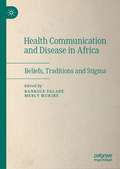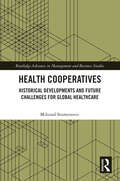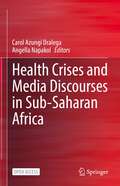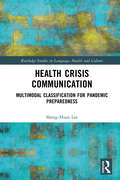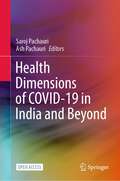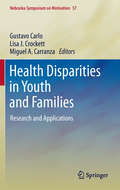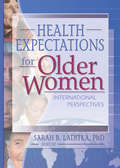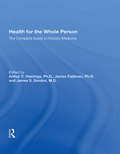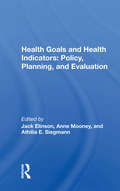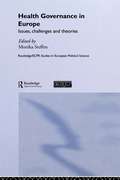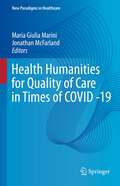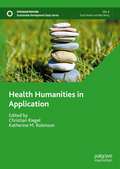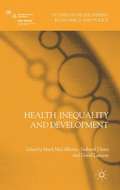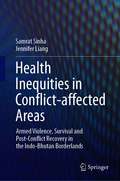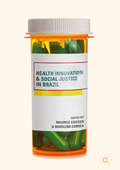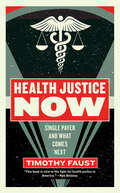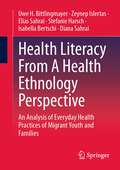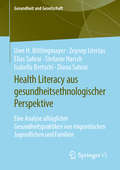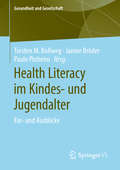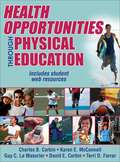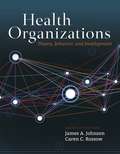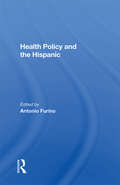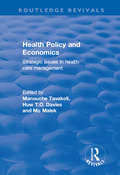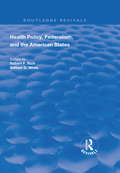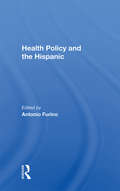- Table View
- List View
Health Communication and Disease in Africa: Beliefs, Traditions and Stigma
by Bankole Falade Mercy MurireThis book is a collection of essays from across Africa which highlight the roles of beliefs and traditions in health behaviour. Chapters address mental health, risk perception, stigma, reproductive health, religion and health. The book also examines conceptual approaches in health communication and community development, both western and indigenous. Specific topics include Alzheimer’s, HIV and stigma; perception of risk from obesity, HIV prevention and preeclampsia; doctor-patient relationship and health beliefs of birth attendants; culture and mental health access and social media effects on mental health; the complementary use of contemporary and indigenous communication strategies and the accommodation of science by religious leaders during the COVID 19 pandemic. The book, which starts by examining global inequalities in health, proposes an African approach informed by problematisation as theorised by Foucault and Freire, to unpack habits and social problems. It ends by asking the question: “Is science enough” and making a strong case for health enabling environments alongside science communication.
Health Cooperatives: Historical Developments and Future Challenges for Global Healthcare (Routledge Advances in Management and Business Studies)
by Milorad StamenovicIn the era of complex healthcare challenges, the question arises: Can health cooperatives be the catalysts for transformation in the healthcare system? This research monograph delves into this thought-provoking query, exploring the potential of health cooperatives as influential entities in the future of healthcare. Despite advancements, healthcare systems still need help with sustainability, equality, costly therapies and various other segments. This monograph aims to dissect the notion of "Healthy lives and well-being for everyone," protracted by policymakers and proponents of the existing healthcare setup. Researchers, cooperative professionals, healthcare practitioners, decision-makers, patients, policy developers, librarians and booksellers will find this book relevant and interesting to read. The captivating narrative is supported by analysing 20 countries across five continents, explaining their historical and modern notion of the context and health cooperatives' development. It also sheds light on the significance of modern cooperatives in the current healthcare landscape. In addition, the monograph offers insights into multiple case studies of health-oriented cooperatives showing their diversity and flexibility in operations. This research monograph paves the way for envisioning a future where health cooperatives have the potential to play an important role in addressing various challenges affecting positive societal changes.
Health Crises and Media Discourses in Sub-Saharan Africa
by Carol Azungi Dralega Angella NapakolThis is an open access book which brings together leading scholars and critical discourses on political, economic, legal, technological, socio-cultural and systemic changes and continuities intersecting media and health crises in Sub-Saharan Africa. The volume extensively discusses COVID-19 but it also covers other epidemics, such as malaria, HIV/AIDS as well as “silent” health crises such as mental health---simmering across the subcontinent. The chapters fill knowledge gaps, highlight innovations, unpack the complexities surrounding the media ecosystem in times of health crises. They explore, among other issues, the politics of public health communication; infodemics; existential threats to media viability; draconian legislations; threats to journalists/journalism; COVID-related entrepreneurship, marginalization, and more.This is a timely resource for academics, advocacy groups, media practitioners and policy makers working on crises and media reporting, not just in Africa but anywhere in the global South.
Health Crisis Communication: Multimodal Classification for Pandemic Preparedness (Routledge Studies in Language, Health and Culture)
by Sheng-Hsun LeeSheng-Hsun Lee develops a new way of understanding public health crisis communication through the lens of multimodal classification. He draws on examples from COVID-19 press conferences in Taiwan and public online comments to outline multimodal classification as sorting pandemic phenomena into categorical types.Lee argues that when public health officials classify health crisis phenomena into categories, they also set parameters for official responses and shape public perceptions of a crisis. He illustrates the argument through examining Taiwan’s initial successes in keeping most infections at bay and subsequent challenges of obtaining enough vaccines for international border reopening. The successes and challenges are closely linked to multimodal classification, which includes using speech, gestures, and objects to make some categories travel broadly and impede the circulation of other categories. The book discusses a wide range of crisis categories from the three dreadful first times—the first confirmed case, the first community-acquired case, and the first death—to the politicized debate over vaccine brands. Lee emphasizes the importance of understanding how crisis categories are produced, circulated, and received. The comprehensive coverage looks beyond initial responses to the COVID-19 pandemic and outside English-dominant places to redefine effective public health messaging. Based on the findings, the book highlights implications for communicating official messages and offers a list of ready-to-use strategies for updating existing guidelines on public health communication.The book is an essential read for public health practitioners and researchers and advanced students in discourse analysis and public health communication.
Health Dimensions of COVID-19 in India and Beyond
by Saroj Pachauri Ash PachauriThis open access book addresses the multiple health dimensions posed by the COVID-19 pandemic in India and other countries including nine in Asia, five in Sub-Saharan Africa, and New Zealand. It explores the impact of the pandemic on mental health, sexual and reproductive health and rights, health financing, self-care, and vaccine development and distribution. The contributing authors discuss its impact on vulnerable populations, including interstate migrants and female sex workers. The significant role of media and communications, rapid dissemination of information in social media, and its impact during the COVID-19 pandemic era are discussed. It closes with lessons learned from the experiences of countries that have contained the pandemic. With contributions from experts from around the world, this book presents solutions of problems that relate to COVID-19. It is a valuable resource appealing to a wide readership across the social sciences and the humanities. Readers include governments, academicians, researchers, policy-makers, program implementers, as well as lay persons.
Health Disparities in Youth and Families
by Lisa J. Crockett Gustavo Carlo Miguel A. CarranzaAmid its growing diversity and shifting demographics, the U.S. is still home to glaring health inequities by race, ethnicity, and class. Yet while it is customary to identify poverty as their root cause, other complex mechanisms are involved in their perpetuation. Based on recent major studies on African-American, Latino, Asian-American, and Native American populations, Health Disparities in Youth and Families offers a thorough, nuanced examination of a wide range of causal--and protective--factors. Rigorous theories and models take into account cultural, contextual, and personal variables, including the roles of family identity, school, and neighborhood, and motivation toward health awareness (with attention paid to less frequently studied phenomena such as within-group inequalities and the Hispanic Health Paradox). Contributors approach their subjects with realism as well as optimism as the book: povides reliable information on the scope and etiology of health disparities, identifies the methodological and political challenges associated with this issue, proposes comprehensive, integrative models for understanding disparities, features examples of innovative programs for improving minority health, includes an in-depth chapter on substance use and mental health among Native American youth, offers a useful starting point for the exchange of ideas necessary to address health disparities. A provocative resource on a pressing social concern, Health Disparities in Youth and Families is necessary reading for health policy researchers, health care providers, and others dedicated to better health outcomes for all Americans.
Health Expectations for Older Women: International Perspectives
by Sarah B. LaditkaExplore international trends in health and longevity--with a special focus on older women!This essential book examines the latest research on life expectancy and “active life expectancy”--the number of years that women can expect to live free from major disability--in developed and developing countries around the world. It also explores the policy implications of the contributors’ findings. Here you'll find a global study using data from the World Health Organization, a European study using data from OECD countries, and studies of women in the United Kingdom, Fiji, The Netherlands, Japan, Canada, and the United States.With contributions from demographers, economists, epidemiologists, gerontologists, medical statisticians, policy analysts, physicians, public health directors, and sociologists, International Perspectives on Health Expectancies for Older Women compares mortality and morbidity trends in various populations. In addition to reviewing the current literature on active life expectancy, this informative book looks at: the distribution of total, unimpaired, and impaired life for several groups of older women defined by race, education, and marital history gender differences in health profiles in The Netherlands gender differences in life with and without six major diseases, including both morbid and mortal conditions in the United States how mortality and morbidity patterns differ for Canadian women and men 45 years of age and older, focusing on risk factors and chronic conditions such as low income, low education, abnormal body mass index, lack of physical activity, smoking, cancer, diabetes, and arthritis patterns of healthy life expectancy for older women around the globe a comparison of the development and progression of physical disability in Japanese men and women and more!
Health For The Whole Person: The Complete Guide To Holistic Medicine
by James Fadiman Arthur C. Hastings James S. GordonThis book presents attitudes, information, and tools for a holistic approach to medicine, health, and mental health. In our discussions among ourselves and with the contributing authors we defined three aspects of a holistic approach. First, such an approach involves expanding our focus to include the many personal, familial, social, and environmental factors that promote health, prevent illness, and encourage healing. Second, a holistic approach views the patient as an individual person, not as a symptom-bearing organism. This attitude emphasizes the self-responsibility of the person for his or her health and the importance of mobilizing the person's own health capacities, rather than treating illness only from the outside. Third, the holistic approach tries to make wise use of the many diagnostic, treatment, and health modalities that are available in addition to the standard materia medica- including alternative medical and healing systems as well as psychological techniques and physical modalities. Some of these methods of treatment and health practices are already accepted, others are accepted but not applied in practice, and still others need further research to explore the range of their uses.
Health Goals And Health Indicators: Policy, Planning, And Evaluation
by Jack Elinson Anne Mooney Athilia E. SiegmannThis volume brings together the perspectives and expertise of both medical and social sciences. The major topics include criteria for the determination of health goals, the analysis of health policies, and the indicators of health status that may he used to judge the consequences of health practices and policies. Unmet health care needs, current national health policy and local planning, health data for policy and planning, and future directions in national health policy are also examined. These issues are then considered in light of the readiness of the sociomedical sciences to measure health status. Contributors discuss the behavioral measurement of health status, the measurement of psychological well-being, the assessment of dental health needs, and the possible impact of recently developed sociomedical health indicators on health policy.
Health Governance in Europe: Issues, Challenges, and Theories (Routledge/ECPR Studies in European Political Science)
by Monika SteffenHealth constitutes a core element of welfare states and a vital nerve in the trust relation between citizen and their governments. Focusing on the health sector, this book analyzes the closely interwoven relationship between the European Union and Member States.The authors explore the dynamic and multi-fold process of de-nationalizing health policies and illustrate how European policies develop in a sector that still appears to be under exclusively national competence. They describe the multiple forms and ways the Europeanization process takes, driven by market integration, public health crises and politics of consumer protection. The authors also provide a detailed analysis of key topics: the pharmaceutical sector, market regulation of medical goods and devices, food safety, the blood provision and plasma industry, European politics on bioethics, and risk reduction in the field of drug abuse.Providing a comprehensive and informed assessment of the Europeanization process in the field of health policies, this book will be of interest to students and scholars of health, European integration and policy-making.
Health Humanities for Quality of Care in Times of COVID -19 (New Paradigms in Healthcare)
by Maria Giulia Marini Jonathan McFarlandThe Covid pandemic has led us into an upheaval that has made us question the certainties underlying what it means to be a human being in our age; the ability to control medical and social facts through evidence. For the first-time western and developed countries have had to confront what many populations from the developing world (Africa. Latin America, etc) face on a daily basis with HIV and Ebola, etc. The Interconnectedness of Globalization has been the real disseminating catalyst of COVID 19, and many scientists wonder if this virus is the result of the Anthropocene age, with its indisputable lack of respect for the natural ecosystems. The virus has demonstrated that our frailty is only skin deep, and it has not only brought death, despair, but it has broken our interdependency as human beings, by imposing self- isolation as well as creating new ways of connections so that safety cannot imply loneliness. In this book, the coping strategies that originate from the multiple languages of care such as narrative, literature, science, philosophy, art, digital science are shown not only as reflective tools to promote health but also wellbeing amongst carers, patients, students, and citizens of our planet Earth. These strategies should be supported by the decision makers since they are low-cost investments necessary to make the health care system work. They however require a change of cultural paradigm. This book is a useful toolkit for patients, citizens and care services physicians who want to learn more on how to live better with this new world.
Health Humanities in Application (Sustainable Development Goals Series)
by Katherine M. Robinson Christian RiegelThis book focuses on health humanities in application. The field reflects many intellectual interests and practical applications, serving researchers, educators, students, health care practitioners, and community members wherever health and wellness and the humanities intersect. How we implement health humanities forms the core approach, and perspectives are global, including North America, Africa, Europe, and India. Emphasizing key developments in health humanities, the book’s chapters examine applications, including reproductive health policy and arts‑based research methods, black feminist approaches to health humanities pedagogy, artistic expressions of lived experience of the coronavirus, narratives of repair and re‑articulation and creativity, cultural competency in physician‑patient communication through dance, embodied dance practice as knowing and healing, interdisciplinarity and transdisciplinarity, eye tracking, ableism and disability, rethinking expertise in disability justice, disability and the Global South, coronavirus and Indian politics, visual storytelling in graphic medicine, and medical progress and racism in graphic fiction.
Health Inequality and Development
by David Lawson Mark Mcgillivray Indranil DuttaThis book investigates issues related to health inequality with a particular interest on developing countries. It provides rigorous empirical work on both trends and causal factors behind health inequality, analyzes the implications of health deprivations on poverty traps and suggests practical policies which can be implemented.
Health Inequities in Conflict-affected Areas: Armed Violence, Survival and Post-Conflict Recovery in the Indo-Bhutan Borderlands
by Samrat Sinha Jennifer LiangThis book provides an insight into the issue of health inequity brought about by the violent conflict in Northeast India. While examining the deep vulnerabilities and loss of well-being suffered by families displaced by conflict in the Indo-Bhutan borderland region, the authors raise fundamental questions of accountability and the role of various stakeholders in providing humanitarian assistance to those affected by the conflict. It highlights for the reader the role played by conflict and armed violence in dismantling a functioning public health system and delineates the long-term barriers to post-conflict recovery. The book is written by those who have worked in implementing development and peacebuilding programs in the Bodoland Territorial Region (BTR) of Western Assam. The book especially brings to the fore the voices of those communities directly affected by conflict in Bodoland. The book is valuable to researchers, development practioners and policy makers. Given the unique format of the book, which includes a number of case studies, it is particularly useful for students of development, public health and allied disciplines such as international relations as well as peace and conflict studies.
Health Innovation and Social Justice in Brazil
by Maurice Cassier Marilena CorreaThis book examines the construction of an innovation system in Brazil’s health industries over the past twenty years. The authors argue that the system has remained active despite the crisis that began in 2014. However, while this crisis has led to cuts in public spending on research and health, it has simultaneously tended to stimulate local production and invention aimed at reducing deficits in the trade in medicines and medical technologies. The contributors highlight a model combining the acquisition of new technologies with social justice and the right to health, and introduce new concepts of the “nationalization” of technologies, innovation through copying and civil society regulation of industrial property and of the medicinal drug market.
Health Justice Now: Single Payer and What Comes Next
by Timothy FaustSingle payer is the tool—health justice is the goal! Single payer healthcare is not complicated: the government pays for all care for all people. It’s cheaper than our current model, and most Americans (and their doctors) already want it. So what’s the deal with our current healthcare system, and why don’t we have something better? <P><P>In Health Justice Now, Timothy Faust explains what single payer is, why we don’t yet have it, and how it can be won. He identifies the actors that have misled us for profit and political gain, dispels the myth that healthcare needs to be personally expensive, shows how we can smoothly transition to a new model, and reveals the slate of humane and progressive reforms that we can only achieve with single payer as the springboard. <P><P>In this impassioned playbook, Faust inspires us to believe in a world where we could leave our job without losing healthcare for ourselves and our kids; where affordable housing is healthcare; and where social justice links arm-in-arm with health justice for us all.
Health Literacy From A Health Ethnology Perspective: An Analysis of Everyday Health Practices of Migrant Youth and Families
by Uwe H. Bittlingmayer Zeynep Islertas Elias Sahrai Stefanie Harsch Isabella Bertschi Diana SahraiThis book presents a health ethnology of health literacy among vulnerable groups. In addition to a comprehensive state of research and the development of a theory-oriented health literacy research, three case studies on vulnerable minorities from Germany and Switzerland are presented. The social dimension of health and health literacy, which can hardly be conceptualized in the individualistic competence-theoretical approaches, is particularly clearly highlighted. This book is a translation of the original German 1st edition Health Literacy aus gesundheitsethnologischer Perspektive by Uwe H. Bittlingmayer, published by Springer Fachmedien Wiesbaden GmbH, part of Springer Nature in 2020. The translation was done with the help of artificial intelligence (machine translation by the service DeepL.com). A subsequent human revision was done primarily in terms of content, so that the book will read stylistically differently from a conventional translation. Springer Nature works continuously to further the development of tools for the production of books and on the related technologies to support the authors.
Health Literacy aus gesundheitsethnologischer Perspektive: Eine Analyse alltäglicher Gesundheitspraktiken von migrantischen Jugendlichen und Familien (Gesundheit und Gesellschaft)
by Uwe H. Bittlingmayer Zeynep Islertas Elias Sahrai Stefanie Harsch Isabella Bertschi Diana SahraiIm vorliegenden Buch wird eine Gesundheitsethnologie der Gesundheitskompetenz von vulnerablen Gruppen vorgelegt. Dabei werden neben einem umfassenden Forschungsstand und die Entwicklung einer theorie-orientierten Health-Literacy-Forschung drei Fallstudien über vulnerable Minderheiten aus Deutschland und der Schweiz präsentiert. Besonders deutlich herausgestellt wird die soziale Dimension von Gesundheit und Gesundheitskompetenz, die in den individualistischen kompetenztheoretischen Zugängen kaum konzeptionalisiert werden kann.
Health Literacy im Kindes- und Jugendalter: Ein- und Ausblicke (Gesundheit und Gesellschaft)
by Paulo Pinheiro Torsten M. Bollweg Janine BröderDas Thema Health Literacy, für das sich im deutschen Sprachgebrauch der Begriff der Gesundheitskompetenz etabliert hat, hat in der jüngeren Vergangenheit eine spürbare Aufwertung in Praxis, Politik und Forschung erfahren. Inhaltlich setzt es sich mit vielfältigen Aspekten des Umgangs mit gesundheitsbezogenen Informationen auseinander und adressiert somit eine Gelingensbedingung für den Erhalt und die Förderung von Gesundheit. Kinder und Jugendliche werden in diesen Kontexten zwar als hochrelevante Zielgruppe angesehen, sind in einer wissenschaftlichen Perspektive auf den Gegenstand bislang jedoch noch nicht ausreichend explizit berücksichtigt worden. Mit dem vorliegenden Sammelband wird ein strukturierender Überblick über den gegenwärtigen Forschungsstand zum Thema Health Literacy im Kindes- und Jugendalter gegeben. Die Sammlung von Beiträgen setzt sich einerseits aus Einblicken in eine Reihe von Forschungsergebnissen zusammen, die sich mit der Tätigkeit des Forschungsverbunds ‚Health Literacy in Childhood and Adolescence (HLCA)‘ assoziieren lassen, und bietet andererseits zahlreiche Anknüpfungspunkte an, die Ausblicke auf künftige Ausrichtungen des Handlungsfelds Health Literacy ermöglichen.
Health Opportunities Through Physical Education
by Charles B. Corbin Guy C. Le Masurier Karen E. McConnell David E. Corbin Terri D. FarrarNIMAC-sourced textbook
Health Organizations: Theory, Behavior, and Development
by James A. Johnson Caren C. RossowOrganizations are complex human systems that have evolved over time and continue to do so in an increasingly globalized, information enriched, technology intensive era such as the 21st century. This is especially so following the Affordable Care Act legislation and regulations in the U.S. <p><p> The new Second Edition of Health Organizations: Theory, Behavior, and Development addresses these changes by integrating new content throughout every chapter and topic area. This book will help the student and practitioner put to use theories of organization and knowledge of organization behavior in ways that foster change in productive and sustainable ways resulting in better outcomes. Students will learn systematic planned approaches for organization development and team building and by examining power, influence, conflict, motivation, and leadership in the context of health service delivery. <p> The Second Edition introduces new elements including: chapter overviews; film learning exercises; key terms; case studies; chapter discussion questions; in-class exercises; online learning activities; key interviews with leaders and managers; appendix; study guide; and other supporting ancillaries.
Health Policy And The Hispanic
by Antonio FurinoExploring the many dimensions of Hispanic health issues, this book updates interested readers with recent information and offers a view of the depth, scope, and complementarity of the challenges of providing adequate health care. Accordingly, the book is organized in four sections addressing, first, the conceptual, institutional, and policy elements of the problems and their solutions; second, the clinical evidence about diseases for which Hispanics are disproportionally at risk; third, social and economic factors that have an impact on the health status of Hispanics; and, fourth, future policy options that could improve the health conditions of this increasingly large and underserved group of Americans. While clarifying the issues, the book documents the importance of seeking solutions to Hispanic health problems with determination and haste. Hispanics will soon represent the largest minority in American society. And, 20 million people with Latin American and Spanish origins contribute a large, youthful, and potentially very productive group of workers to our aging labor force. Finally, in searching for solutions to Hispanic health challenges, we learn that in order to improve the health of all Americans, while containing costs, it is necessary to address, proactively, the special needs of our culturally diverse society.
Health Policy and Economics: Strategic Issues in Health Care Management (Routledge Revivals)
by Mo Malek Manouche Tavakoli Huw T.o. DaviesThis title was first published in 2001: The papers in this volume, selected from nearly 100 submissions to the Fourth International Conference on Strategic Issues in Health Care Management, reflect the work taking place in health economics. The first five chapters in the collection examine the role of economics within clinical guidelines and suggest methods of improving the quality of economic evaluation which is now at the centre of decision-making in the NHS. The second section of the book is comprised of two papers on inequalities and access. The third part contains four papers, two of which cover reviews and tackle some theoretical issues regarding demand, and two are applied case studies. The fourth section assesses performance, and the final four papers review health reforms in a number of countries including the UK, Canada, France and Turkey.
Health Policy, Federalism and the American States (Routledge Revivals)
by Robert F. Rich William D. WhiteFirst published in 1997, this volume emerged in the ongoing struggle between those favouring centralized and those favouring decentralized government, and has three goals: 1) To illustrate how theories of federalism and intergovernmental relations can provide a useful framework for examining how to 'divide up the job in the health care area'; 2) To assess the capacity of the states to actually implement health care policy changes; 3) To weigh the merits of alternative visions of the future roles of states and the federal government in health care policy.
Health Policy/spec Sale/avail Hard Only
by Antonio FurinoExploring the many dimensions of Hispanic health issues, this book updates interested readers with recent information and offers a view of the depth, scope, and complementarity of the challenges of providing adequate health care. Accordingly, the book is organized in four sections addressing, first, the conceptual, institutional, and policy element
